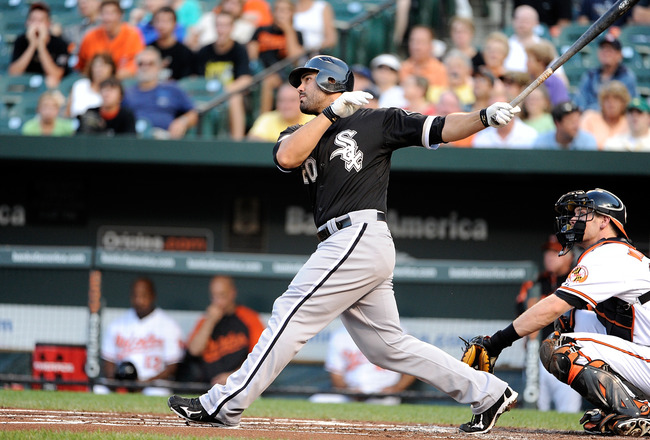
In the early hours of New Year's Eve, the White Sox made a pseudo-rebuilding trade, shifting Carlos "Second-Best Hitter On the Team" Quentin to the San Diego Padres in return for a pair of non-prospects in Simon Castro and Pedro Hernandez. This marks a classic 'What the #&$! am I doing?' trade from a pair of 'What the #&!$ are they doing?' GMs, Chicago's Kenny Williams and Josh Byrnes of the Padres.
What do the Padres get?
Carlos Quentin, in all his decent-hitting, poor-fielding glory. Quentin is a pretty good hitter, posting a 124 OPS+ in 118 games in 2011, but that's really where the flattery ends. He is a poor corner outfielder, meaning he's an ideal DH candidate. He has struggled to stay healthy, playing an average of 116 games since 2009, topping out at 131 in 2010.
The big detriment of Quentin in San Diego is that his skills align very poorly for PETCO Park. He was a bad outfielder in the cozy confines of US Cellular Field and getting DH breaks, but in PETCO he will be exposed even more and should make a run at the title of least valuable fielder in baseball in 2012. Some of this may be offset by Cameron Maybin, San Diego's fantastic center fielder, and that may have been on the Padres' mind when they pulled the trigger for this move, but Andruw Jones couldn't make Quentin look like a good outfielder. Additionally, Maybin won't be able to cheat into right field, as he will have to protect terrifically bad Yonder Alonso in left (barring a trade of Anthony Rizzo, facilitating a return to first for Alonso).
Additionally, Quentin's offense does not apply itself well to the type of park that PETCO is. Quentin is not a line-drive hitter, which is the type of hitter that most takes advantage of a spacious ballpark, with a career LD-rate of just 17% (2% below league-average). He is a fly ball hitter, the kind that are typically ruined in the PETCOs of the league. According to his HitTracker charts he would lose four of his 2011 home runs by playing in PETCO. Moreover, PETCO is particularly rough on right-handed hitters. It is an awful hitters' park overall, as its 81 tOPS+ will attest, but it is even worse on righties, who OPS+d just 77 there compared to the rest of the league, meaning that PETCO took a staggering 23% of their value -- the worst in the NL. Compare this with US Cellular, where righties were actually at 102, and you can see that Quentin's value is in for a hit.
So that's what San Diego is getting: a bad fielder who will probably hit at an above-average pace, but is likely to struggle to stay on the field as well. There is also some talk that Quentin may bring the Padres a draft pick next offseason, but that remains to be seen.
What do the White Sox get?
Primarily, a salary dump. MLB Trade Rumors has Quentin projected to earn $7.5 MM in 2012, his third season of arbitration, and, as Kenny Williams tries to shed salary and rebuild (I think?), dropping $7.5 MM is always a plus.
Chicago also pulled in a pair of minor league arms that may or may not contribute at the major league level. Simon Castro was a top-100 prospect in each of the last two years, but will be 24 in 2012 and has struggled mightily at the Triple-A level, with a 9.50 ERA and and a 1.13 K/BB in 8 starts. Williams claims that Chicago knows how to turn him around, and if this is true, Castro's deep arsenal of quality pitches could make him a plus reliever or solid back-of-the-rotation starter, but the odds of this are slim.
Pedro Hernandez is kind of a nobody. He throws a ton of strikes and features a plus change, and someday may get MLB hitters out, but he is youngish, and probably not ready for that next step yet. John Sickels rated him as a level-C prospect.
The Winner
I can't pick one. I would almost say Chicago: one year of Quentin does virtually nothing for them, as they should not compete in 2012, they save $7.5 MM, and get a couple of guys that, if the breaks go right, could be MLB contributors. That having been said, I think this was timed poorly. Quentin would almost certainly have fetched a better return in mid-season, especially if he'd performed well in the first half. I think Kenny Williams rushed this, or was forced to take the first decent deal by an ownership that is eager to renege on their monstrous, underachieving 2011 payroll.
The Loser
I think both clubs will come to regret this trade in some way, but the big loser here is Quentin. If he had stayed in Chicago, put up a decent year, took a crack at 30 home runs, he was one of the bigger hitters in next year's free agent class, drawing competition from guys like BJ Upton and Marlon Byrd. In San Diego, his offensive numbers will take a big hit, and I predict him to be exposed as a terrible fielder, all things that will scare away potential suitors. Josh Willingham got $21 MM from the Twins recently, and Quentin could have been looking at a $10 MM AAV deal with a strong 2012, but the odds of that happening are small indeed.
The Bottom Line
As is becoming custom, Kenny Williams is having trouble figuring out which direction his team is going. Similarly typical, Josh Byrnes is content building a 'good enough' team. When counting things like salary relief, Chicago probably walked away in better shape from this deal, but Williams probably timed it poorly, and got a worse return than he should have.

No comments:
Post a Comment